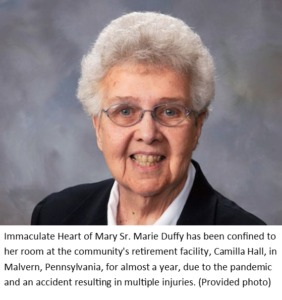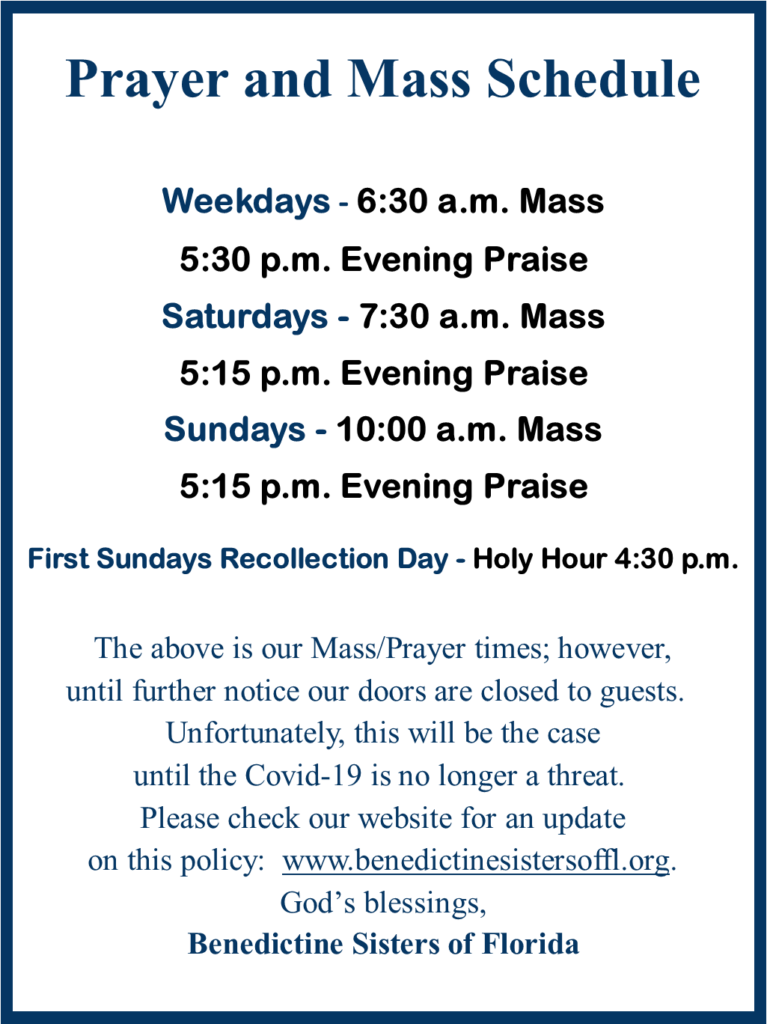Sisters find spiritual sustenance during year of COVID-19 hardship
~Article by Elizabeth Eisenstadt Evans for the Global Sisters Report, a project of National Catholic Reporter
Sr. Marie Duffy had it all planned out, she said.
Settled comfortably into her congregation’s retirement facility, Camilla Hall, the 87-year-old Immaculate Heart of Mary sister, a former guidance counselor, would embrace the “second calling” in her life. “I can’t wait until I can have coffee, have time to pray and not to drive, and just be with God,” Duffy said she remembers thinking. She enjoyed a year with friends on the independent living floor.
Then came the pandemic. After that, a fall. And on Sept. 11, 2020, Duffy entered a local hospital, where she had three surgeries on her leg and hip. For five months, she was bed bound.
surgeries on her leg and hip. For five months, she was bed bound.
“It was a year of very mixed emotions,” said Duffy. “I felt that God was playing a trick on me.”
Cut off from community life and aware that many others were struggling with the impact of the COVID-19 virus, she felt a “deep sadness” even though she was being treated, she said, with love and tenderness. “I found it difficult to talk with my God. I would say, ‘Where are you? Where are you, not just for me but for other people?’ ”
For Catholic sisters, as for many others in America and across the globe, it’s been a brutal year.
Isolation. Disrupted schedules and forced adaptation. Dark nights of the soul. Loss.
Sisters have experienced the death of community members, separation from loved ones, painful months of isolation, and uncertainty. Some sisters shared in candid reflections how the past year had brought not only lifestyle changes, but also prompted them to grapple with deep spiritual questions, such as the purpose of suffering, community and what it feels like when God seems to go quiet. Some provided examples of how — in addition to prayer — spiritual practices rooted in activities such as cooking, acts of kindness and dancing provided a sense of peace and stability.
‘Not in control’
“The pandemic has reminded us that we are essentially not in control of our lives,” said Sr. Sallie Latkovich, a member of the Congregation of St. Joseph living in Chicago who serves as spiritual director and as part of her congregation’s leadership team. “For sisters there’s a fundamental belief, but [also] a new kind of questioning, coming to new awareness and probably actually a deepening of faith.”
Spiritual directors like Latkovich have logged many hours, mostly online, with those navigating uncertainty amid the pandemic. Their directees, a diverse group who often include people of faith who aren’t sisters, are struggling to find meaning and purpose amid pandemic upheaval, loss, and sacrifice.
Requests for spiritual direction have gone up by about 10% during the pandemic, estimated Sr. Carole Riley, 78, a member of the Sisters of Divine Providence who directs the West Virginia Institute for Spirituality. “I can only communicate with people through Zoom, and it’s been intense,” said Riley, who used to travel regularly to Pennsylvania and Ohio. While older sisters have had more training in quiet contemplation, “the loss of touch and ability to communicate [in person] has increased the need for spiritual direction, particularly among the younger 30s and 40s age group.”
The sheer number of people dying sparked deep reflections for her directees, she said, including wondering what they are supposed to be doing with their lives, and how to live them more fully.
Suffering, pain and anxiety were themes that surfaced often in conversations with sisters. Her directees had something else in common: “Across the board, they are talking about decluttering, how to lead a less hectic life. I don’t think we realized how hectic the [religious] life was,” she said. “Then we had to stop, there was a lockdown, and in the face of possible death we were forced to look.”
“My own policy is to feel the fear and the anxiety, acknowledge it,” said Riley. “My first step is to feel the feelings before I turn to prayer or Scripture.”
In New Orleans, Sr. Dorothy Trosclair, a Dominican Sister of Peace, said that her directees, who include sisters, have found themselves bringing their most profound emotions into prayer. “They find God working amid contemporary suffering, political unrest, racism and violence. All of these seem to bring people into deeper dependence on God and each other. They wrestle with suffering and understand on a deeper level that God is also suffering.”
Many faces of loss
In many communities, particularly where older sisters lived in large numbers, those who stayed healthy have been keenly aware that others were not as fortunate. Since May, 47 sisters in Camilla Hall have tested positive for COVID-19, with seven deaths caused by the virus or strongly related to it, according to Immaculate Heart of Mary Sr. Anne Veronica Burrows, Camilla Hall administrator.
“Being in a nursing home, you really do think of suffering and how you would relate to it,” said Camilla Hall resident Sr. Anne Kelly, 83. But “being in a situation where everyone is experiencing some diminishment, you can feel blessed. We pray for the sister who is in great suffering.”
Even younger sisters admit to at times feeling overwhelmed by the pain around them. In the early months of the pandemic, 40-year-old Sr. Erin McDonald, a member of the Congregation of St. Joseph in Detroit, Michigan, who serves as chaplain, said she felt helpless, unsure and scared. She wrestled with some big questions, she said, “how do I respond to the dear neighbor? How do I stand in solidarity with the needs of the time? How do I pray?”
She sought solace by adding two long walks a day to her routine, and a lot of cooking from scratch. “Cooking for me is a contemplative practice,” she said. She answered the question of how to pray by praying more, adding 45 minutes to her evening prayer practice.
Sr. Amanda Russell, 29, said that she’s been praying for a year to be a light in a sometimes-dark world. “I think we religious have had a very important role in the midst of this pandemic,” she said. Given the blessing of time to pray, said the Immaculate Heart of Mary sister, “if we don’t share what we’ve received as grace, then I don’t know what we are doing. Even if it is saying, ‘This is a struggle for me,’ and standing with someone in their struggle.”
She’s had her own struggle, moving from Philadelphia to Savannah, Georgia, to be a teacher at St. James Catholic School mid-pandemic. Because of the timing of the move, she had to miss her renewal of vows ceremony. Though she’s adjusted to her job and the sisters in her new convent, she’s ached for the companionship of her family, still living in a Philadelphia suburb, and her close friends.
“Virtual isn’t the same in any sense as being able to spend time with people.”
In spite of the difficulties, she has tried to do everything in a spirit of joy, she said “because you’re doing it for other people, for God. It all sounds beautiful and holy and sacred until you have to live it.”
Praying through a plague
Prayer, whether it was personal, communal or part of the Mass, was an anchor, many of the sisters said. The upside of a lockdown is that there’s “lots of extra time for prayer,” said Kelly at Camilla Hall. “I have spent a lot more time in the chapel and feel a closeness with the Lord. There are no distractions.”
In addition to solitary devotions, she participates in the liturgical cycles of morning prayer, evening prayer, special prayer services for national events like the election and the insurrection, and community Mass.
“During the shutdown, we had Mass every day in the convent chapel with the priests of our parish. It is hard to put words on what that was like,” wrote Immaculate Heart of Mary Sr. Danielle Truex in an email from Lancaster, Pennsylvania, where she is the principal of Sacred Heart School. “First, I felt very privileged and guilty that I was able to attend Mass and receive the Blessed Sacrament when so many others were going without. At the same time, I felt blessed to be able to carry all that was in the hearts of God’s people with me during that time. One of the most meaningful things we did in my local community was to have Adoration each afternoon in our chapel. Normally, our school schedule wouldn’t allow for that amount of time for prayer together and it, along with Mass, became the pillars of each day.”
Some sisters said that they were taking advantage of the opportunity to experience virtual liturgy outside their normal parishes or convents. “I certainly do miss being in person with the community of faith. However, there is a sense of the community as people post comments through the service,” said Latkovich, who noted the “exquisite” quality of the eucharistic liturgy at Old St. Patrick’s Church in Chicago. “It’s as good as livestream liturgy gets,” she wrote in an email.
Riley said frankly that she doesn’t miss attending Mass. She’s enjoying the experience of exploring online services in other venues — like the Vatican. “Emotionally, I’m free to pray rather than fret I’d bring home the virus and kill my sisters,” she emailed.
 The biggest impact the pandemic had on her, said Felician Sr. Desiré Findlay, 34 was that as vocation minister for her community she couldn’t travel to the schools and churches visited regularly before. Nor could she lead in-person retreats. Yet as she moved retreats and discernment opportunities to Zoom, Findlay found that “it opened up an opportunity for us to journey with a wider audience.” Findlay, who has long expressed her spirituality through movement, also began to host liturgical dance Zoom groups.
The biggest impact the pandemic had on her, said Felician Sr. Desiré Findlay, 34 was that as vocation minister for her community she couldn’t travel to the schools and churches visited regularly before. Nor could she lead in-person retreats. Yet as she moved retreats and discernment opportunities to Zoom, Findlay found that “it opened up an opportunity for us to journey with a wider audience.” Findlay, who has long expressed her spirituality through movement, also began to host liturgical dance Zoom groups.
‘Powerful learnings’
Several sisters said that they made an intentional connection between the social unrest of the past year and the tragic impact of the virus. The killings of George Floyd and others by police, the resulting Black Lives Matter protests of last summer and grappling with pervasive racial injustice will always be intertwined with their experience of the pandemic, they said.
A member of the Adorers of the Blood of Christ, Sr. Mary Kevin Rooney called this past year a “backward grace” that offered the possibility of awakening to some uncomfortable truths about American life. “We can never walk away from what we know about the injustice to our Black brothers and sisters. We can’t go back to ‘that doesn’t involve me.’ ”
The epidemic of inequality has reinforced the “urgent need to look at Black lives in general,” said Findlay. “It definitely got me to ask more questions about these issues. When people of color say that they are worried about getting the vaccine in the first place, I get it.”
In St. Louis, Missouri, Sr. Clara Mahilia Roache, a member of the Apostles of the Sacred Heart of Jesus, said in an email that the hardest part of the pandemic for her had been “seeing the disparity across the nation in handling the pandemic and the effect on the poor.” For help, and a sense that God is present she has turned to “prayer, podcasts and people,” recommending in particular the podcast “Ask Father Josh” and the weekly audiences held by Pope Francis.
Sisters said that they have developed an even deeper appreciation of the bonds of community. “I see people learning to appreciate the time we can spend with each other, celebrations, all those things,” said Findlay. “God gave us each other, and what we do affects the other.”
In addition, she said, the pandemic has sparked creativity and a deeper desire for connection with sisters here and around the world. A discernment retreat she hosted via Zoom included women from the U.S., Nigeria, Australia, Ireland and Canada. Some have continued these conversations once a month via Zoom, she said.
That sense of community goes beyond congregations. Latkovich praised the mutual care taken by neighbors in her apartment complex, where residents often now check in with each other or offer to shop for someone else when going to the store. “There’s a new sensitivity and a desire to help. The gospel of ‘love your neighbor as yourself’ is happening. I find God present in all of that,” she added.
For sisters here and abroad, the pandemic has been a time of “powerful learnings”, suggested Sr. Lynn Levo, a member of the community of St. Joseph of Carondelet. “We have been strongly reminded that we are relational, emotional beings, with a humanity that is rooted in connection with others,” said Levo. A therapist, Levo said she has been busy since last March helping American and global Catholic leaders, sisters and first line responders understand the impact of the pandemic and how cope with it.
As spiritual people, sisters already know that their own pain is integrally connected to that of others, she said. “It means the opportunities to respond in some way to the injustices happening all around us.” As one elderly sister in a meeting Levo facilitated put it: ” ‘It’s o.k. to be sad.’ I was there offering assistance, and here was a sister who allowed accompaniment.”
 In such an unsettled time, cultivating human relationships based on similar candid self-disclosure is crucial, added Levo. She recommended that everyone to have a go-to confidante, even if they aren’t a close friend. “Now we have the gift of time, not only to talk to God but to feel the support of a loving God. One of the things we want to include is our feelings, which are really a deeper sense of who we are.”
In such an unsettled time, cultivating human relationships based on similar candid self-disclosure is crucial, added Levo. She recommended that everyone to have a go-to confidante, even if they aren’t a close friend. “Now we have the gift of time, not only to talk to God but to feel the support of a loving God. One of the things we want to include is our feelings, which are really a deeper sense of who we are.”
New beginnings, new hope
Now on a walker after months of confinement, Duffy is retooling her original game-plan. Still hopeful that she will be able to return to the independent living floor by August of this year, she’s also willing to adjust her expectations if she can’t.
In the meantime, she’s making the best of the situation, taking the opportunity to talk with those on her floor with Alzheimer’s that she sees on her walks up and down the hall, or who stop by the door of her room to chat. That may be, she said, a way she is being called to serve in these circumstances. “I feel that God is somehow using this as a teaching moment for me,” she said. “This is why you have a second calling: time to reach out to people.”
Continue Reading















